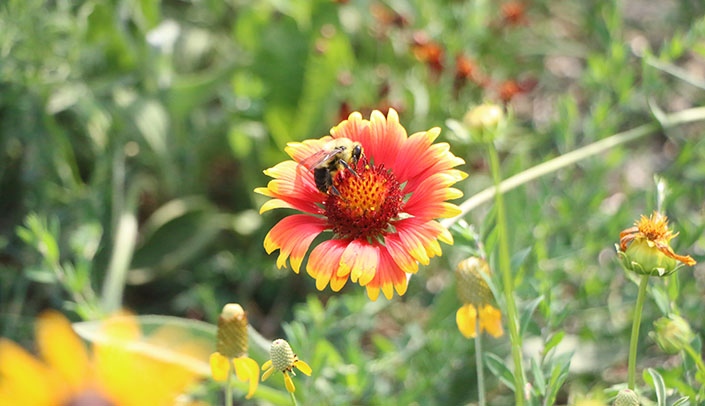National Honey Bee Day

This Saturday, Aug. 21, is National Honey Bee Day. Did you know that honey bees are responsible for one in every three bites of food we eat?
Honey bees account for 90% of the pollination required for our crops to grow and are responsible for more than $1 billion in agricultural productivity within the U.S. Not only do bees contribute to most of the food we eat, they also:
- Help create medicines and raw materials;
- Provide food for wildlife;
- Keep waterways clean;
- Prevent soil erosion;
- Help with the production of oxygen; and
- Absorb CO2, which helps mitigate climate change and keep our air clean.
We can all help save the bees. In 2020, the med center received a grant to replace turf grass with native plants that help support pollinators like honey bees. Take a walk over to the lower level of parking lot 16, between the Truhlsen Eye Institute and Home Instead Center for Successful Aging, to check out the prairie and see some pollinators in action.
Despite the country’s massive reliance on honey bees in agriculture and other systems, these bees are declining at an alarming rate. In 1988, there were around 5 million hives in the U.S.; today there are only 2.5 million. The decline of honey bees can be attributed to several different factors: parasites, pesticides, habitat destruction, air pollution and climate change. If honey bee populations continue to decline toward extinction, many of our everyday necessities will no longer be available, and our health will be in jeopardy. We won’t have access to food we eat every day and medications we use, there will be much more air pollution, and the environment will experience huge shifts within all ecosystems.
National Honey Bee Day is an opportunity to recognize how much honey bees do to sustain our ecosystems, protect natural resources and ensure human health. It’s also a day to appreciate all of the beekeepers and honey bee associations that help support these important pollinators.
Some ways you can help save the bees in your own life include: avoiding pesticides and fertilizers, providing more trees and bee gardens in your yard, helping local beekeepers and organizations and educating others on the importance of bees. Check out this blog from City Sprouts to find out more about how you can help.
